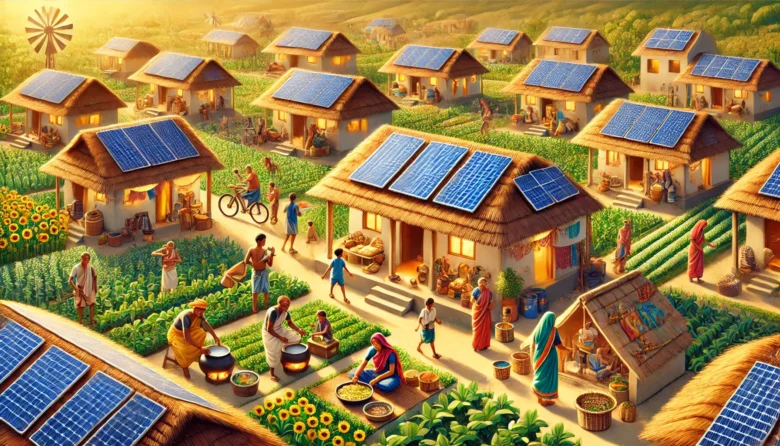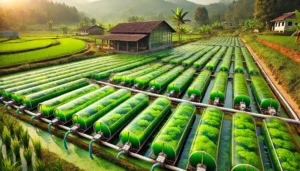In India, renewable energy cooperatives are gaining traction as a way to generate power sustainably and empower local communities. By pooling resources and efforts, communities can create renewable energy sources, ensuring a reliable and eco-friendly power supply. In this blog, we’ll delve into renewable energy cooperatives, why they matter, and how they can transform India’s energy landscape.
What Are Renewable Energy Cooperatives?
Renewable energy cooperatives are organizations formed by community members to produce and manage renewable energy. These cooperatives typically focus on harnessing energy from solar, wind, and biomass sources. The idea is simple: instead of relying on large utility companies, communities combine to generate their power, sharing the benefits and responsibilities.
Why Renewable Energy Cooperatives Matter
Local Empowerment
A major benefit of renewable energy cooperatives is that they empower local communities. By taking control of their energy production, communities become more self-reliant and resilient. This is particularly important in rural areas, where access to reliable electricity can be limited.
Environmental Benefits
Renewable energy cooperatives contribute to reducing carbon emissions by relying on clean energy sources. This helps mitigate climate change and decrease air pollution, resulting in a healthier environment for all.
Economic Advantages
These cooperatives also offer economic benefits. Communities can lower their electricity expenses by producing their own energy. Moreover, any excess energy can be sold back to the grid, providing an extra source of income. This model supports local economies and creates job opportunities in renewable energy projects.

How Renewable Energy Cooperatives Work
Forming a Cooperative
The first step in creating a renewable energy cooperative is bringing together community members who are interested in the project. This group will form the cooperative, establish goals, and decide on the type of renewable energy they want to produce.
Securing Funding
Funding is a crucial aspect of any renewable energy project. Cooperatives can secure funding through member contributions, government grants, and loans. Various schemes and subsidies are available in India to support renewable energy initiatives.
Setting Up the Infrastructure
Once the cooperative is formed and funding is secured, the next step is to set up the necessary infrastructure. This might involve installing solar panels, wind turbines, or biogas plants. Technical expertise and proper planning are essential to ensure the project’s success.
Managing and Maintaining the System
After the infrastructure is in place, the cooperative members must manage and maintain the system. This includes regular maintenance, monitoring energy production, and handling any technical issues that arise.
Success Stories in India
Dharnai, Bihar
One inspiring example of a renewable energy cooperative is in Dharnai, a village in Bihar. With the help of Greenpeace India (an environmental organization focused on sustainability), the community set up a solar-powered microgrid. This project has provided reliable electricity to the entire village, improving the quality of life and boosting local businesses.
Odanthurai, Tamil Nadu
Another success story is Odanthurai, a village in Tamil Nadu. The village set up a wind turbine cooperative, generating enough power for local consumption and selling excess electricity back to the grid. This initiative has significantly enhanced the village’s economy and set a benchmark for others to follow.
How You Can Support Renewable Energy Cooperatives
Get Involved Locally
If you’re passionate about renewable energy, consider joining a local cooperative or starting one in your community. Gather like-minded individuals and explore the possibilities of generating your own clean energy.
Advocate for Policy Support
Advocate for policies and initiatives that support renewable energy cooperatives. Advocate for government subsidies, grants, and favorable regulations that make it easier for communities to set up and manage these projects.
Spread Awareness
Inform others about the advantages of renewable energy cooperatives. Share success stories, engage in community discussions, and use social media to highlight the importance of sustainable energy practices.
Conclusion
Renewable energy cooperatives represent a powerful way to balance economic needs with environmental sustainability. By enabling communities to produce their own clean energy, we can build a more resilient, environmentally friendly, and prosperous India. Let’s embrace this innovative model and work together to build a sustainable future.
Author’s Note:
Thank you for reading! Renewable energy cooperatives are a testament to what communities can achieve when they come together with a common goal. Let’s continue to support and promote such initiatives for a brighter, greener future.
G.C., Ecosociosphere contributor.



